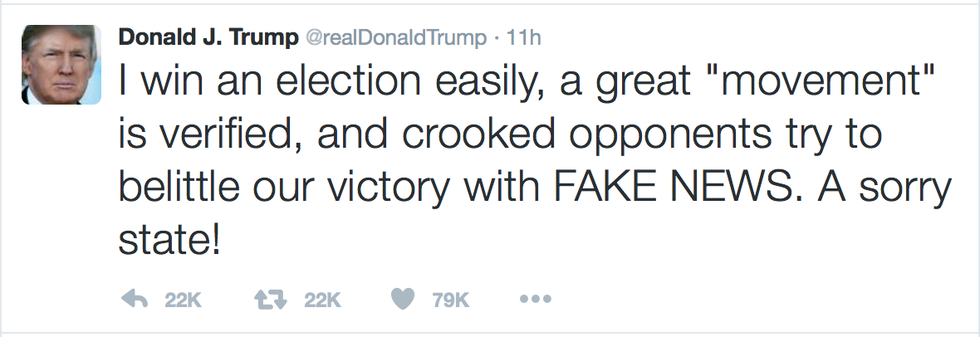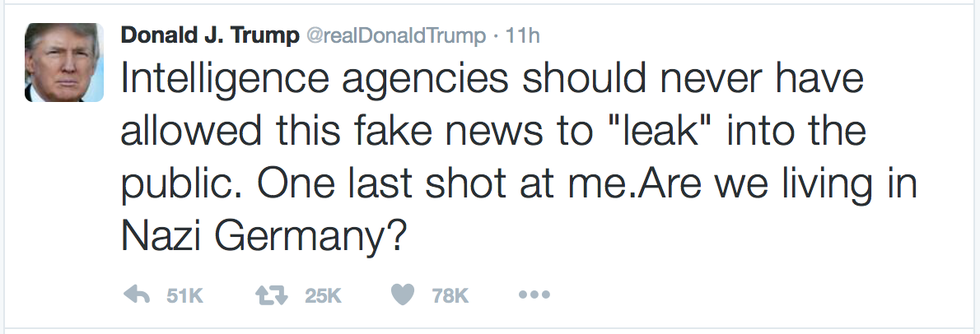Just ten days before president-elect Donald Trump’s inauguration, BuzzFeed leaked a report declaring the Russian government has compromising information on Trump. Although the credibility of the report is in question, the claims are, if even partially true, indicative of a serious international conflict. The 35-page document outlines threats to U.S. cybersecurity, Russia’s involvement in the United States presidential election, Trump’s campaign’s communication with Russia, and sources for financial and sexual blackmail against Trump.
Of course, human nature took over on Twitter, which focused almost exclusively on the alleged sexual acts highlighted on the second page of the intelligence report rather than the threat to national security. The leak claimed that Trump had ordered Russian prostitutes to perform “golden showers” in a hotel’s presidential suite where he knew the Obamas had stayed. Soon after the report leak, the story was the second leading trend worldwide on Twitter, just after #ObamaFarewell. Regardless of the unconfirmed status of the report, Twitter users made sure Americans got the graphic details with hashtags such as #GoldenShowers, #PEEOTUS, and #MakeAmericaUrinateAgain.
The purpose of these tweets is not necessarily to spread information (how much can anyone say in 140 characters or less?) but to spread awareness and individuals’ voices. The message from these tweets that we can take away is that the public knows and disapproves of Trump’s alleged behavior. The integration of humor into a serious issue—especially in a brief format such as a tweet—caters to the human attention span that craves constant entertainment in order to maximize the shares and thereby number of viewers a post gets.
Despite the efficiency of communication through Twitter, the underlying problem is that people begin to rely on fake news when the media doesn’t sufficiently cover issues that deserve attention. During a press conference, Donald Trump himself unwittingly pointed out the danger of a government’s role in media censorship by refusing to allow CNN reporter Jim Acosta to speak.
The advantage of Twitter, despite its many flaws, is that it allows each and every user to get their news out into the world without hinderance. Most Twitter users do not face any consequences after posting something unflattering or even outright condemning of a public figure, unlike media outlets that will be deemed less credible if their reports show evidence of bias. Even though Trump was able to prevent Acosta from asking questions by bellowing over him, and then attempted to delegitimize the entire news source by passing it off as “terrible” and “fake news,” he can do nothing about what the public has to say on Twitter—except tweet about it.
In this tweet, Trump is implying that just by releasing information—even though no major sources have claimed the leaked document to be true yet—the media is attacking him out of spite and has no credibility.
Once again, Trump is calling the people whose president he will soon be his “crooked opponents.” He does not view the media as a tool for the public to have access to information, but as a nasty trick to compromise his campaign even over a month after the election. In doing so, he undermines the freedom of the press, because with this logic, every bit of news against him can be brushed off as merely “belittling [the Republican party’s] victory.”Twitter is not a reliable news source. Tweets are brief, easy to misunderstand, do not allow for a developed story or much background information to go along with each post, and the people who are able to post on Twitter do not need to be fact-checked. You may as well stand on a busy street corner and listen to the passersby. However, that is exactly where it has value: there is a chance to hear a wide range of the public’s thoughts in very little time. It is a tool to combat censorship and hold public figures accountable for their words.































